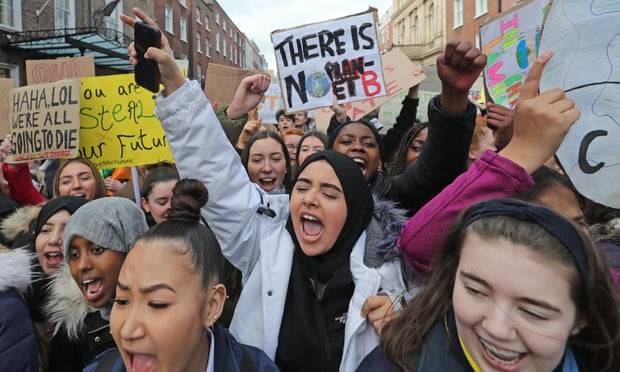DUBLIN - Ireland is preparing to unveil an ambitious plan to tackle the climate emergency by weaning the state, businesses, farms and households off fossil fuels.
The government is due to publish a long-awaited report on Monday afternoon outlining almost 200 measures to curb the country’s greenhouse gas emissions and set a path for net zero carbon emissions by 2050.
It envisages a rise in carbon taxes, a multibillion euro scheme to retro-fit houses, limits on petrol and diesel vehicles and a number of other measures to change behaviour by institutions, companies and individuals, according to leaked drafts.
Ireland is one of the European Union’s worst carbon emission offenders and is facing fines of more than €250m for missing 2020 targets on reducing emissions and adopting renewable energy.
Trends in agriculture and transport mean emissions are set to continue rising in the next few years, risking even steeper fines for missing 2030 goals and raising questions over if and how Ireland will make its bold plan a reality.
Leo Varadkar’s centre-right government is entering a general election cycle and is wary of alienating poorer and rural voters with higher carbon taxes – the trigger for France’s yellow-vest protests. Support for Ireland’s Green party surged in local and European elections last month, reflecting growing concern over the climate crisis.
Richard Bruton, the minister for climate action, delivered the Climate Action Plan to Tackle Climate Breakdown report to the cabinet on Monday morning in advance of publication. It draws on a report published earlier this year by an all-party committee. According to a leaked draft, the government plan outlines a “path” to net zero carbon emissions by 2050, a significantly bolder ambition than the previous commitment to reduce emissions by 80% – but an aspiration, not a binding target.
The report also commits Ireland to 2030 EU goals – to avert fines estimated at €6bn it must slash emissions from 60m to 33m tonnes – by planting more trees and buying carbon credits from other countries.
It is also expected to set deadlines for shutting peat- and coal-fired power stations and for ramping up the use of renewable sources for electricity generation. Much is expected to come from new onshore and offshore wind turbines.
The central strategy involves increasing carbon taxes from €20 to €80 per tonne by 2030 – a politically fraught exercise that will require cushioning poor people and rural dwellers from higher fuel and heating prices.
Billions of euros will be set aside to help builders and property owners retrofit buildings to make them more energy efficient. Oil and gas boilers will be prohibited from new homes by 2025.
Local authorities will reportedly be allowed to ban petrol and diesel cars from certain parts of towns and cities to nudge people towards walking, cycling, public transport and electric vehicles. A car-scrappage scheme to accelerate the move toward electric vehicles is also under consideration.
Another measure targets financial services: pension providers will have to disclose if they hold fossil fuel assets, giving pension-holders the option to switch providers.






